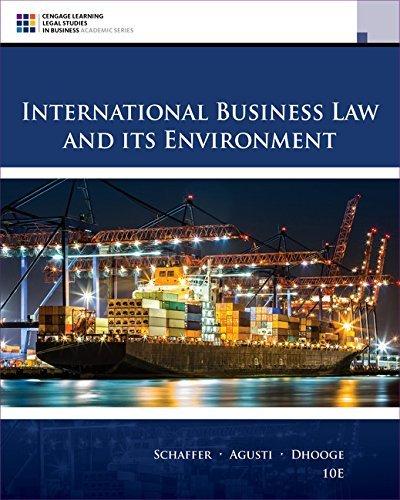1. Few would think that the United States would permit the import of goods made by forced,...
Question:
a. Under what ethical theory do you think the United States could have justified the "consumptive demand" exception in its trade laws? Do you feel this was appropriate?
b. Your firm designs and sells branded clothing and apparel worldwide. It relies on contract manufacturing by suppliers for cutting, sewing, and assembling finished goods through an established supply chain.
You are asked by your firm's CEO to prepare a corporate ethics statement on procurement of goods or materials produced by forced, prison, or indentured labor. What would you include in that statement? You may consult Chapter 19 and outside sources for additional information.
c. There are several nongovernmental and inter-governmental organizations devoted to fair labor issues. Which ones do you think would be good sources of information?
d. What ideas do you have to assure that abuses are not happening upstream in your supply chain with foreign suppliers?
e. What are the U.S. government's enforcement powers under the 2015 statute, and what powers do law enforcement agencies have to stop these imports?
2. Your firm is a paper converter. It converts paperboard into various articles for use in homes and restaurants for food preparation, sale, and storage. Its products are pizza boxes, ice cream boxes, bakery and deli boxes, and paper plates as well as boxes and trays for use in fast-food operations. You purchase paperboard from both domestic and foreign sources. Recently, a Chinese supplier has begun offering paperboard at extremely low prices-far lower than what you have been paying domestically. One of your colleagues at your firm calls the offer "too good to be true." You have always had reliable sources of supply, but the offer is very tempting. Why might the foreign exporter be cutting prices to U.S. customers? What information do you think you need before committing to a purchase? Specifically, what pricing information do you need? If it turns out that the products are being "dumped" in the U.S. market, what would be the result and how might it affect your firm and your purchasing decision? Do you think it is fair or unfair for an exporter to dump its goods in a foreign market? Evaluate the statement, "Selling at a low price can't be unfair."
Fantastic news! We've Found the answer you've been seeking!
Step by Step Answer:
Related Book For 

International Business Law And Its Environment
ISBN: 9781305972599
10th Edition
Authors: Richard Schaffer, Filiberto Agusti, Lucien J. Dhooge
Question Posted:





